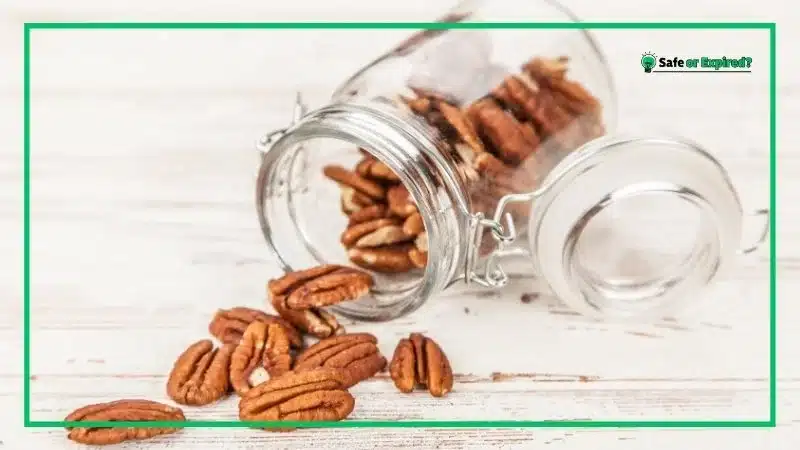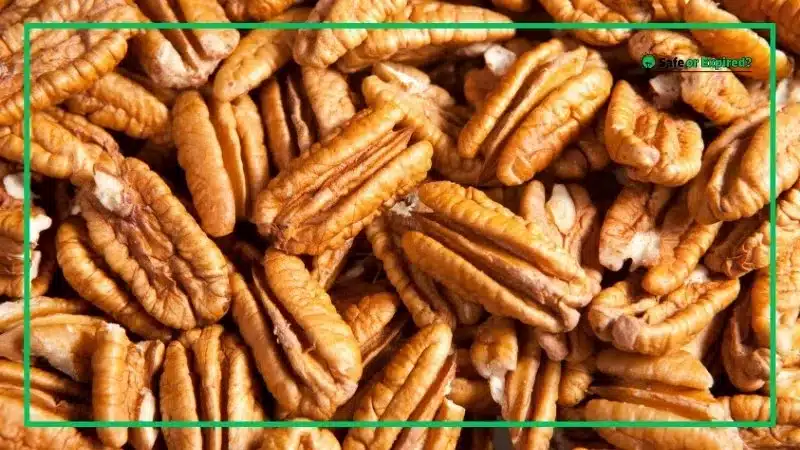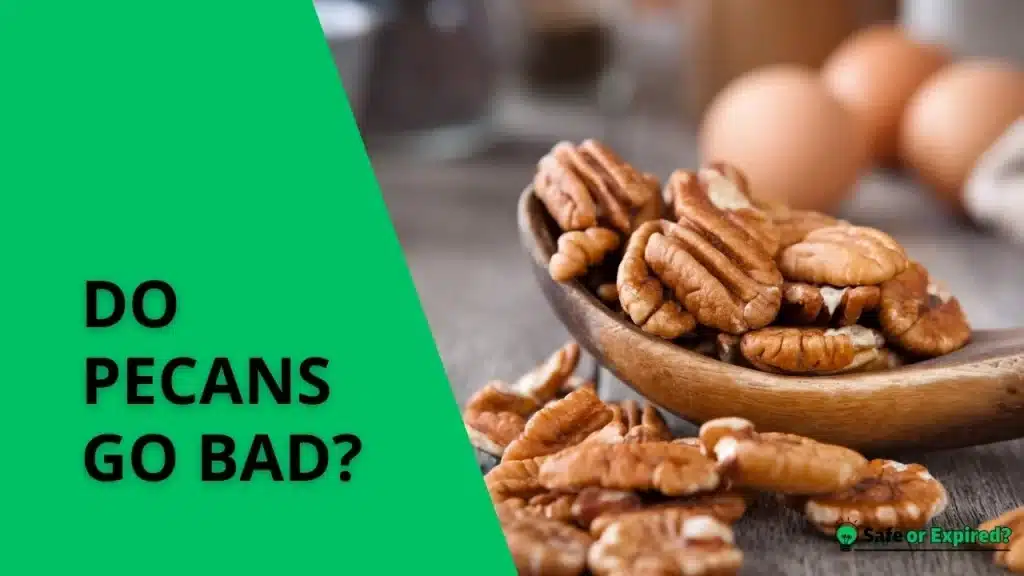“Do pecans go bad?” is a valid question for nut enthusiasts. The answer is that they do go bad. However, knowing how to store them properly can extend their freshness significantly.
So, don’t go anywhere. This article will guide you through identifying bad pecans and provide practical tips for maximizing their shelf life.
Do Pecans Go Bad? Here’s What I Know
Yes, pecans can go bad. Pecans contain oils that can become rancid over time, especially if not stored properly. Signs of spoilage include a sour or bitter taste and a musty or off smell. Proper storage is key to extending their freshness and ensuring they remain tasty to eat.
People often ask, “Do pecans go bad in the fridge? Well, storing pecans in the fridge can help extend their shelf life by slowing down the rancidity process. In the refrigerator, pecans can maintain their quality for about six months to one year. Always keep them in an airtight container to prevent absorption of odors from other foods.

Many also wonder, “Do pecans go bad in the freezer?” Pecans stored in the freezer remain safe and retain their quality for up to two years. Freezing pecans is an excellent way to preserve their freshness, as the cold temperature prevents the oils in the nuts from becoming rancid.
Always remember that pecans should be stored in the freezer correctly. Place them in airtight bags to prevent moisture and air exposure. This method helps preserve their flavor and texture for extended periods, making them readily available for use anytime.
Misconceptions about food preservation are common. Clear up confusion with “Debunking Popular Food Preservation Myths.”
How Long Do Pecans Last?
Pecans typically last about six months when stored at room temperature, up to one year in the refrigerator, and can extend up to two years if kept in the freezer. The longevity largely depends on the storage conditions, which significantly affect their freshness and flavor.
These are the most common factors affecting the shelf life of pecans:
- Storage Conditions: Temperature, humidity, and light exposure can all influence pecan longevity.
- Packaging: Airtight containers or vacuum-sealed bags help protect pecans from moisture and odors.
- Quality at Purchase: Fresher pecans, free from any signs of spoilage when bought, last longer.
- Processing: Shelled pecans spoil faster than unshelled ones due to “extra” exposure to air, light, and moisture.
Now, let’s discuss some standard questions.
How Long Do Pecans Last at Room Temperature?
At room temperature, pecans can remain good for about six months if stored in a cool, dry place. To maximize their shelf life, keep the pecans away from direct sunlight. It’s also recommended to put them in an airtight container to protect them from those factors that spoil them. The common ones are air and humidity.
How Long Do Pecans Last in the Fridge?
When stored in the refrigerator, pecans can last for up to one year. The cooler environment slows down the degradation process and prevents the oils within the pecans from turning rancid quickly. Store them in an airtight container if you want to maintain freshness.
How Long Do Pecans Last After Expiration Date?
Pecans can still be safe to eat for several months beyond their expiration date if they have been stored properly. However, their quality might diminish over time. That’s why experts suggest throwing away expired food items.
In short, you should remember this shelf life table only:
| Storage Condition | Counter | Fridge |
| Opened | 1 to 2 months | Up to 6 months |
| Unopened | Up to 6 months | 9 to 12 months |
Now, you know proper storage is key to keeping food fresh longer. Get helpful advice from “Essential Food Storage and Preservation Tips.”
Do Pecans Go Bad in the Shell?
Yes, pecans can go bad even when left in their shell, although they typically last longer this way. Shelled pecans can stay good for up to two years if stored under ideal conditions, thanks to the natural protection offered by their hard outer shell.
Pecans stored in their shells are less susceptible to spoilage because the shell provides a natural barrier against air and moisture, two of the primary culprits that speed up the rancidity process in nuts. This protective layer helps maintain the freshness of the oils inside the pecans, extending their shelf life.
However, even in-shell pecans can deteriorate if exposed to warm temperatures, high humidity, or pests.
Do Unshelled Pecans Go Bad?
Yes, unshelled pecans can go bad. Although they typically last longer than their shelled counterparts due to the protective barrier their shell provides, they are still prone to spoilage if not stored correctly.
Proper storage is key to extending pecan’s shelf life and maintaining its quality.
Unshelled pecans have their natural shell, which helps them stay good for a longer time. The shell keeps out air, moisture, and light, which can make pecans go bad faster. However, if you keep these pecans in a place that’s too warm or damp, they can start to mold, or the oils inside them can spoil, making them taste bad.
Do Bagged Pecans Go Bad?
Yes, bagged pecans can go bad. The rate at which they spoil depends largely on the packaging and storage conditions. If the bag is not airtight or if the pecans are exposed to unfavorable conditions, they may become rancid or moldy quickly.
A tight, sealed bag helps keep the pecans fresh by stopping air and moisture from getting in. These two things can make the oils in pecans spoil.
You should keep bagged pecans in a cool, dark place like a cupboard to help them stay fresh for a few months. If you live in a hot place or it’s summertime, you might want to keep them in the fridge. This is especially true if you’ve opened the bag.
Always check the pecans for any bad smells, a weird taste, or mold before you eat them, especially if the bag has been opened before.
Do Candied Pecans Go Bad?
Yes, candied pecans can go bad. They typically last less time than plain pecans due to the added ingredients. Candied pecans are pecans coated with a mixture often containing sugar, syrup, and spices.
This delicious treat is popular, especially during holidays, but it does not last as long as plain pecans. The sugar and fats added to make candied pecans can draw moisture, which can lead to spoilage faster than usual.
To keep candied pecans fresh, store them in an airtight container in a dry place. If you’ve made a large batch or won’t eat them quickly, you might consider storing them in the refrigerator. This can help keep them crunchy and delicious for about a month.
For even longer storage, you can freeze them. Frozen, they can last for several months. Always check for signs of spoilage, such as a sticky or slimy texture, an off smell, or any visible mold before eating.
Do Chopped Pecans Go Bad?
Yes, chopped pecans can go bad. Since they are cut into smaller pieces, they have more surface area exposed to air and light, which speeds up spoilage. The natural oils in pecans can turn rancid when exposed to these elements, which affects their flavor and safety.
To maximize the shelf life of chopped pecans, keep them in a tightly sealed container or bag. Storing them in the fridge is a good idea, especially if you won’t use them right away. In the fridge, chopped pecans can last for about six months. If you need to store them for longer, freezing is the best option.
In the freezer, they can last up to a year. Make sure to use airtight packaging to avoid freezer burn and odor absorption from other foods.
Do Frozen Pecans Go Bad?
Yes, frozen pecans can go bad, but it takes a long time. Properly stored, they can last up to two years in the freezer. When you freeze pecans, you’re significantly slowing down the processes that cause them to spoil. Freezing keeps the pecans’ natural oils from turning rancid, which is what happens when these oils are exposed to air and heat.
The cold environment of a freezer also prevents the growth of mold and bacteria, which need warmth and moisture to thrive.
However, even in the freezer, pecans aren’t entirely safe from spoilage. If they are not stored correctly, moisture can get into the packaging and lead to freezer burn, which affects their texture and flavor.
To prevent this, make sure to use airtight containers or freezer bags to keep the nuts sealed off from air and moisture. Also, label the storage container with the date, so you know how long they have been stored. While frozen pecans can last up to two years, it’s always a good idea to check them for any signs of spoilage before use.
Do Roasted Pecans Go Bad?
Yes, roasted pecans do go bad. They spoil faster than raw pecans because roasting releases their natural oils, making them more prone to rancidity. Moreover, the heat from roasting causes the pecans’ natural oils to come to the surface, where they are more exposed to air.

How To Tell If Pecans Are Bad? Check Out the Signs
To tell if pecans are bad, check for a few things. First, smell them. If they smell sour or like paint, they’re probably spoiled. Next, try tasting a small piece. If it tastes bitter or off, it’s best to throw them out. Moreover, if they’re mushy or slimy, that’s another sign they’ve gone bad.
Sour or Rancid Smell
Pecans contain natural oils that can go rancid when exposed to air for too long. If your pecans have a sour or sharp smell, they are likely bad. This change happens because the oils oxidize, which means the fat in the nuts is breaking down.
A fresh pecan should smell slightly sweet or nutty. If you’re unsure about the smell, compare it with a new batch of pecans to see if there’s a noticeable difference.
Off Taste
Tasting your pecans is a surefire way to check their quality. If they taste bitter or sour, it’s a sign they’ve gone bad. Fresh pecans have a rich, buttery flavor, so any deviation from this taste can indicate spoilage. Remember, tasting should be the last check after you’ve confirmed the pecans look and smell normal. It’s not worth tasting pecans that already show other signs of spoilage.
Moldy Appearance
Look closely at your pecans. If you see any signs of mold — usually white, green, or black fuzzy spots — do not eat them. Mold can develop on pecans if they’re stored in moist conditions. Mold on food can produce mycotoxins, which are harmful if ingested. Always discard pecans with any mold, no matter how small the amount might seem.
Change in Texture
Fresh pecans should be crunchy. If they feel soft, rubbery, or dry and shriveled, these texture changes can indicate that the pecans are past their prime. Moisture from the air can make them soft, and too much air exposure can dry them out and make them stale. Keep your pecans in an airtight container to help maintain their natural texture.
Discoloration
Normal pecans have a rich brown color. Any discoloration, such as a darker or blackened appearance, can indicate that the pecans have gone bad. This could be due to improper storage, such as exposure to too much light or moisture. If the pecans look unusually dark or have spots that are different from their natural color, it’s best to throw them away.
Preventing food spoilage starts with understanding its causes. Learn more in “Key Factors Behind Food Spoilage.”
What Happens if You Eat Bad Pecans? expect this
Eating bad pecans can lead to some unpleasant effects. If the pecans are rancid or spoiled, they might taste bitter and could cause stomach upset or nausea. Rancid nuts contain harmful free radicals that can lead to various health issues if consumed frequently over time.
Here’s what you need to know:
- Digestive Issues: The most common symptom from eating bad pecans is stomach upset. This includes cramps, nausea, vomiting, and diarrhea. These symptoms occur because your body is trying to rid itself of harmful substances.
- Mold Exposure: Moldy pecans may contain mycotoxins, which are toxic substances produced by molds. Ingesting these can lead to more severe health issues, including allergic reactions and respiratory problems. If you have a mold allergy, the reaction can be immediate and severe.
- Rancid Fats: Eating pecans that have gone rancid (when the oils in the pecans break down) can also be harmful. Rancid fats are oxidized fats that can increase the amount of harmful free radicals in your body. This can contribute to inflammation and has been linked to various chronic diseases.
Following guidelines ensure safe food handling. Find recommendations from top institutions in “Key Food Safety Guidelines.”
Can You Use Pecans After the Expiration Date?
Yes, you can often use pecans after the expiration date, as long as they show no signs of spoilage such as an off smell, mold, or rancid taste. The expiration date on pecan packaging typically indicates the period during which the product will be at its best quality.
Here’s what you should know about using pecans past this date:
- Check for Freshness: Before using pecans that are past their expiration date, examine them closely. Look for any mold, unusual odors, or a bitter taste. These are clear indicators that the pecans should not be consumed.
- Storage Matters: How long pecans last beyond their expiration date largely depends on how they were stored. Pecans kept in airtight containers in cool, dry places or refrigerated can last longer than those stored at room temperature.
- Freezing for Longevity: If you want to extend the shelf life of pecans significantly, consider freezing them. Frozen pecans can last for up to two years if stored properly. Make sure to use freezer-safe bags or containers to prevent freezer burn.
- Uses for Older Pecans: If your pecans are slightly past the expiration date but still good, they can be used in cooked dishes like baked goods or roasted for salads, where any slight imperfections in flavor are less noticeable.
- Health Implications: Consuming slightly stale pecans isn’t usually harmful if they aren’t spoiled or moldy. However, eating rancid pecans can lead to digestive discomfort, so it’s important to use your senses to assess their quality.
What To Do with Old Pecans? Proven Tips
Old pecans can still be useful. Consider roasting them to enhance their flavor, using them in baking, or even creating pecan butter. Ensure they’re not spoiled before using.
Roast to Revive
Roasting old pecans can bring back some of their lost flavor and crunch. Just spread the pecans on a baking sheet, drizzle a little oil, sprinkle some salt, and roast in the oven at 355 degrees Fahrenheit for about 10 minutes. Keep an eye on them to make sure they don’t burn. This simple process can make them tasty again, perfect for adding to salads or just snacking.
Bake with Them
Old pecans can be a great addition to baked goods. They add a nutty flavor to snacks like breads, muffins, and cookies. Even if they’re a bit stale, the other ingredients and the baking process can mask that. Just chop them up and mix them into your batter. This is a fantastic way to use up large quantities of pecans that are nearing the end of their shelf life.
Make Pecan Butter
Transform old pecans into homemade pecan butter. It’s simple: just blend the pecans in a food processor until they turn into a creamy, smooth butter. You can add a touch of salt, honey, or cinnamon for flavor. This pecan butter is delicious spread on toast, blended into smoothies, or used in various recipes as a substitute for regular butter.
Create Pecan Flour
Old pecans can be ground into flour, offering a gluten-free alternative to traditional flours. Use a blender to grind the pecans finely. Pecan flour can be used in pie crusts, as a breading for meats, or in any recipe that calls for almond flour. It’s a great way to give a second life to pecans that are not fresh enough for snacking but still good for cooking.
Add to Compost
If your old pecans are truly past their prime and not suitable for consumption, consider adding them to your compost bin. They break down and contribute to creating rich, nutritious soil for your garden. Make sure they’re not salted or seasoned if you’re going to compost them, as added ingredients can be harmful to the composting process.
Conclusion
Wrapping up, understanding the shelf life of pecans, and recognizing when they are past their prime can help you enjoy them safely and reduce waste. Here are the key takeaways:
- Pecans do go bad.
- Proper storage in airtight containers can keep pecans fresh for months.
- Look for signs like an off smell, a bitter taste, or mold to identify bad pecans.
- Always check pecans before use to ensure they provide the best flavor and safety.
By following these guidelines, you can ensure that your pecans remain delicious and safe to eat while making the most of every nut in your pantry!

